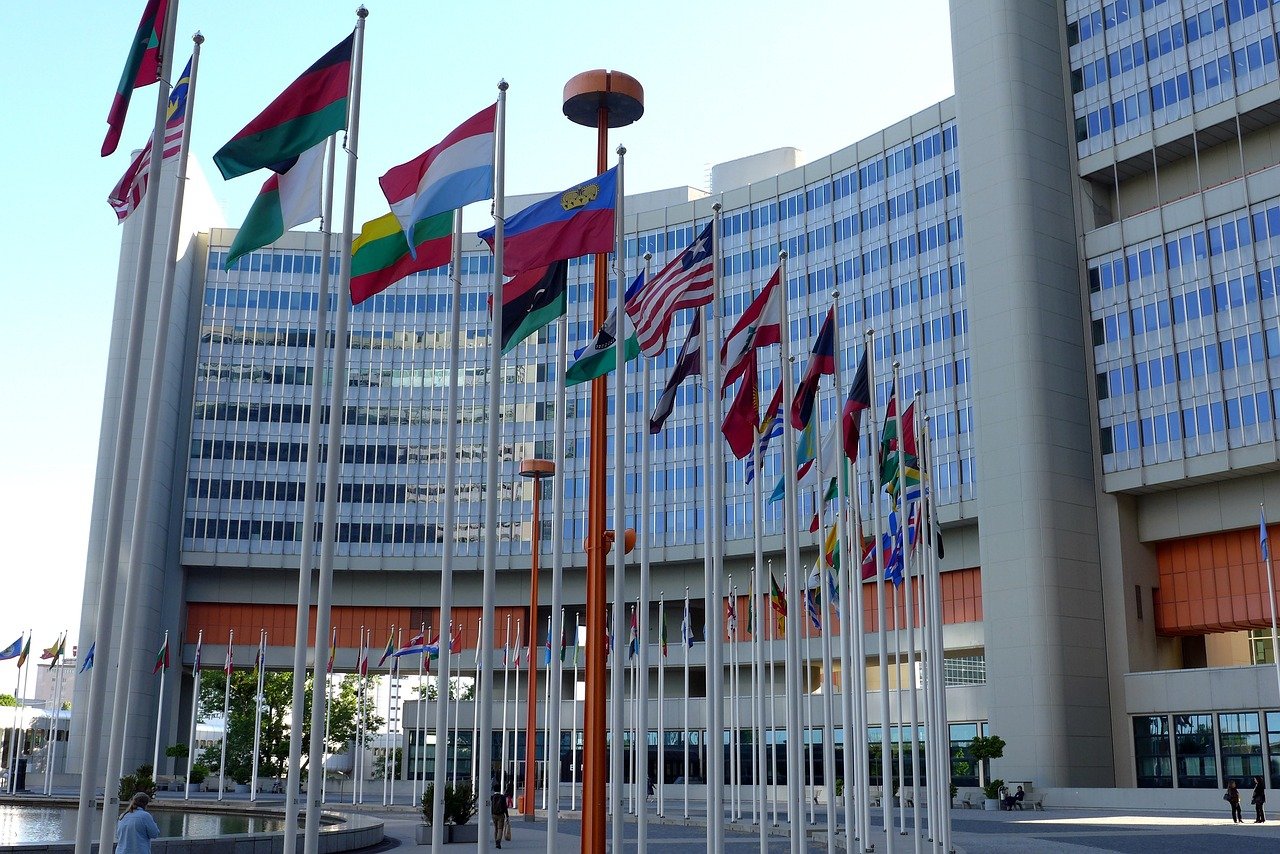Are you a student with aspirations of becoming a diplomat in the USA? If so, you’re in the right place! This article will guide you through the necessary steps to achieve your goal. Whether it’s representing your country on an international stage or working towards global peace and cooperation, the path to becoming a diplomat is challenging yet rewarding. From acquiring the relevant education to gaining practical experience, we will explore the key elements that will set you on the right track towards a successful diplomatic career. Get ready to embark on an exciting journey towards making a difference in the world as a diplomat!
Steps to Becoming a Diplomat in the USA
Becoming a diplomat in the United States is an exciting path that allows you to represent your country on the international stage. However, it requires careful planning and preparation. This comprehensive guide will walk you through the necessary steps to embark on this rewarding career journey.

This image is property of pixabay.com.
Choosing a Relevant Field of Study
To start your journey towards becoming a diplomat, it is essential to choose a relevant field of study that aligns with your interests and strengths. Diplomacy encompasses a wide range of disciplines, including international relations, political science, and public policy.
Identify Interests and Strengths
Take time to reflect on your personal interests and strengths. Consider the subjects that captivate you and the skills that you excel in. This self-reflection will help determine the most suitable field of study for your diplomatic career.
Research Diplomatic Positions
Gain a deeper understanding of various diplomatic positions and their corresponding academic requirements. Explore the different roles within the diplomatic arena to find the best fit for your aspirations.
Select a Suitable Degree Program
After thorough research, select a suitable degree program that will provide you with the necessary knowledge and skills. Look for universities with strong programs in international relations, political science, or public policy.
Earning a Bachelor’s Degree
A bachelor’s degree is a crucial milestone on your journey to becoming a diplomat. It not only provides you with essential knowledge but also demonstrates your dedication and commitment to your field of study.
Complete Undergraduate Coursework
During your undergraduate studies, complete coursework in your chosen field of study. Take advantage of classes that cover topics like international diplomacy, foreign policy, and global politics.
Engage in Leadership and Extracurricular Activities
Participate in leadership positions and extracurricular activities that develop your skills in teamwork, communication, and organization. Join student organizations that focus on international affairs, diplomacy, or service to gain practical experience.
Seek Internship Opportunities
Explore internship opportunities in public service organizations, think tanks, or government agencies. These internships provide valuable hands-on experience in the field of diplomacy and help build your professional network.
Network with Professionals in the Field
Attend conferences, seminars, and networking events where you can meet professionals already working in the diplomatic field. Building connections can provide insights into the industry and future career opportunities.
Maintain a Strong GPA
Maintaining a strong grade point average (GPA) is crucial for your future academic and professional endeavors. A high GPA demonstrates your commitment to academic excellence and can improve your chances of acceptance into graduate programs.

This image is property of pixabay.com.
Gaining Work Experience
Work experience in relevant fields is essential to enhance your understanding of international relations and diplomacy. It allows you to apply theoretical knowledge to real-world situations.
Seek Entry-Level Positions
Look for entry-level positions in government agencies or non-governmental organizations that focus on international affairs. These positions provide valuable insight and practical experience in diplomacy.
Conduct Internships in Public Service Organizations
Internships with public service organizations, such as the United Nations or State Department, offer an opportunity to gain firsthand experience in diplomacy. These internships allow you to observe diplomatic processes and develop essential skills.
Work in International Organizations
Consider working in international organizations, such as humanitarian agencies or non-profit organizations. These experiences provide a broader global perspective and expose you to diverse cultures and challenges.
Participate in Study Abroad Programs
Participating in study abroad programs immerses you in different cultures and broadens your understanding of international relations. It allows you to develop cross-cultural communication skills and gain a global perspective.
Engage in Volunteer Work
Volunteer work, especially in organizations focused on diplomacy or global issues, not only showcases your commitment to public service but also offers valuable opportunities for networking and skill development.
Pursuing a Master’s Degree
Pursuing a master’s degree in a relevant field can significantly enhance your credentials and increase your chances of career advancement in the diplomatic field.
Evaluate the Benefits of a Master’s Degree
Consider the benefits of obtaining a master’s degree in terms of career opportunities, specialized knowledge, and personal growth. Assess whether a master’s degree aligns with your long-term goals as a diplomat.
Research Relevant Graduate Programs
Thoroughly research graduate programs in international relations, global affairs, or diplomacy. Look for programs with a strong track record and faculty expertise in areas that align with your interests.
Apply to Suitable Programs
Submit applications to suitable graduate programs that match your academic and career aspirations. Ensure that your application materials, such as transcripts, personal statements, and letters of recommendation, showcase your passion and readiness for advanced study.
Consider International Relations, Global Affairs, or Diplomacy Programs
Consider specialized master’s programs specifically designed for aspiring diplomats. These programs often provide internships, language training, and networking opportunities tailored to the diplomatic field.

This image is property of pixabay.com.
Acquiring Foreign Language Skills
Fluency in foreign languages is a valuable skill for diplomats. It allows you to effectively communicate and negotiate with foreign counterparts, fostering stronger diplomatic relationships.
Identify the Importance of Language Skills in Diplomacy
Recognize the significance of language skills in diplomacy. Proficiency in a foreign language demonstrates cultural sensitivity, adaptability, and a commitment to effective communication.
Choose a Target Language
Select a target language based on its relevance to your desired diplomatic career path. Consider the languages commonly spoken in regions or countries where you aspire to work.
Enroll in Language Courses
Enroll in language courses at your university or language institutes to develop your language skills. Commit to consistent practice and study to achieve fluency.
Immerse Yourself in the Language and Culture
Immerse yourself in the target language and culture by participating in language immersion programs or studying abroad. Surrounding yourself with native speakers accelerates language acquisition and cultural understanding.
Practice Language Skills through Conversations and Writing
Engage in conversations with native speakers to practice your language skills. Additionally, regularly writing in the target language helps improve your written communication abilities. Seek feedback from language instructors or native speakers to ensure continued progress.
Passing the Foreign Service Officer Test
The Foreign Service Officer Test (FSOT) is an essential hurdle to clear on your path to becoming a diplomat. It assesses your knowledge, analytical skills, and situational judgment.
Familiarize Yourself with the Exam Format
Thoroughly familiarize yourself with the exam format, including the different sections and time limits. Understanding the test structure helps you allocate your study time effectively.
Study Key Subject Areas: Politics, History, Economics, and Culture
Devote time to studying key subject areas, such as politics, history, economics, and culture. Read widely, stay updated on current events, and enhance your knowledge of international affairs.
Develop Strong Writing and Analytical Skills
Practice writing concisely and effectively to demonstrate your analytical skills during the written portion of the exam. Mastering the art of written persuasion is particularly important for essay questions.
Review Sample Questions and Practice Tests
Review sample questions and practice tests available online or through preparation materials. This familiarity with the test structure and question types will help build your confidence and improve your performance.
Seek Preparation Resources and Courses
Consider enrolling in FSOT preparation courses or utilizing study guides to better understand the exam requirements and to have access to expert guidance. These resources can help you focus your studies and refine your test-taking strategies.
Completing the Medical and Security Clearance Process
Before embarking on a diplomatic career, you must successfully complete the medical and security clearance process. These steps ensure your suitability for diplomatic service.
Schedule and Complete a Medical Examination
Schedule and complete a thorough medical examination to confirm your physical and mental fitness. This examination ensures that you meet the health requirements set by the Foreign Service.
Undergo a Thorough Background Check
Undergo a comprehensive background investigation conducted by the security clearance process. The investigation includes reviewing your personal history, contacts, and finances to verify your trustworthiness and eligibility for access to classified information.
Ensure Financial Responsibility and Stability
Demonstrate financial responsibility and stability by managing your debts, paying bills promptly, and maintaining a clean financial record. Financial irresponsibility can raise red flags during the security clearance process.
Address Any Potential Security Concerns
If you have any potential security concerns—such as previous legal issues or associations with individuals of interest—be proactive in addressing these matters. Consult with legal counsel or seek guidance from security clearance professionals, if necessary.
Attending the Foreign Service Institute
Once you have successfully passed the previous steps, you will attend the prestigious Foreign Service Institute (FSI). This training facility prepares you for the rigors and challenges of a career in the Foreign Service.
Receive an Appointment as a Foreign Service Officer
Upon successfully completing the previous steps, you will receive an appointment as a Foreign Service Officer (FSO). This appointment is a significant milestone on your way to becoming a diplomat.
Participate in Orientation and Training Programs
Participate in orientation and training programs at the Foreign Service Institute. These programs provide you with knowledge of diplomatic skills, protocols, negotiation techniques, and the Foreign Service framework.
Learn Diplomatic Skills, Protocols, and Negotiation Techniques
During your time at the Foreign Service Institute, you will acquire essential diplomatic skills, learn diplomatic protocols, and practice effective negotiation techniques. These skills form the foundation of a successful diplomatic career.
Engage in Language and Culture Training
Further enhance your language skills and cultural understanding through intensive language and culture training programs offered at the Foreign Service Institute. These programs prepare you for effective communication in your assigned country or region.
Acquire Knowledge about Country or Region of Assignment
Aspiring diplomats attending the Foreign Service Institute gain expert knowledge about the country or region to which they will be assigned. This knowledge allows you to navigate the cultural context, understand local dynamics, and represent your country effectively.
Advancing in the Diplomatic Career
Upon completion of your preparation and training, you will enter the entry-level Foreign Service Officer career. However, the journey does not end there.
Pursue Advanced Assignments and Leadership Roles
Continuously seek opportunities for advanced assignments and leadership roles within the Foreign Service. Demonstrate your excellence and adaptability to take on additional responsibilities.
Demonstrate Excellence and Skill Development
Strive for excellence in every aspect of your diplomatic career. Regularly update your knowledge, refine your skills, and seek professional growth opportunities to stay competitive and relevant.
Seek Opportunities for Specialization
Consider specializing in specific diplomatic areas such as political, economic, or consular tracks. Becoming an expert in a particular field enhances your value and opens doors to further career advancement.
Consider Political, Economic, or Consular Tracks
Explore various tracks within the diplomatic field, such as political, economic, or consular tracks. Choose the track that aligns with your interests and skills, allowing you to focus on areas where you can make the most significant impact.
Attend Professional Development Programs and Trainings
Continually invest in your professional development by attending workshops, seminars, and trainings. These opportunities provide valuable insights, networking prospects, and help you stay attuned to the latest trends in diplomacy.
Embarking on the path to becoming a diplomat in the United States requires a combination of education, experience, language proficiency, and perseverance. By following these comprehensive steps, you will be well-prepared to represent your country on the global stage and contribute to building stronger international relationships. Good luck on your diplomatic journey!